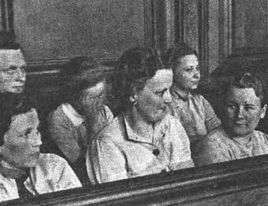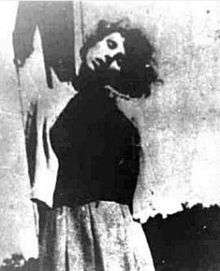Elisabeth Becker

.jpg)

Elisabeth Becker (20 July 1923 – 4 July 1946) was a concentration camp guard in World War II.
Life
Becker was born in Neuteich, Free City of Danzig (today Nowy Staw, Poland) to a German family. In 1936, aged 13, she joined the League of German Girls. In 1938 she became a cook in Danzig. In 1939 the Germans arrived in the city, and Becker reportedly adapted successfully. In 1940 she began working for the firm Dokendorf in Neuteich, where she was employed until 1941, when she became an agriculture assistant in Danzig.
Camps
In 1944, the SS needed more guards at the nearby concentration camp at Stutthof, and Becker was called up for service. She arrived at Stutthof on September 5, 1944 to begin training as an SS Aufseherin. She later worked in the Stutthof women's camp at SK-III. There, she personally selected women and children for the gas chamber.
Post war
Becker fled the camp on 15 January 1945 and went back home to Neuteich. On 13 April, Polish police arrested her and placed her in prison to await trial. The Stutthof Trial began in Danzig on 31 May 1946 with five former SS women and several kapos as defendants. Becker, along with the other ten defendants, was sentenced to death. She sent several letters to Polish president Bolesław Bierut requesting a pardon, claiming her actions had not been as severe as Gerda Steinhoff's or Jenny-Wanda Barkmann's. No pardon was issued, and she was publicly hanged (by the short drop method) on 4 July 1946 at Biskupia Gorka along with the ten other SS supervisors and kapos. Nevertheless, from the pictures, her neck was broken and she would have been unconscious quickly, unlike some of the other condemned guards.[1]
See also
| Wikimedia Commons has media related to Elisabeth Becker. |
References
- ↑ "1946: Eleven from the Stutthof concentration camp". Retrieved 2012-07-22.